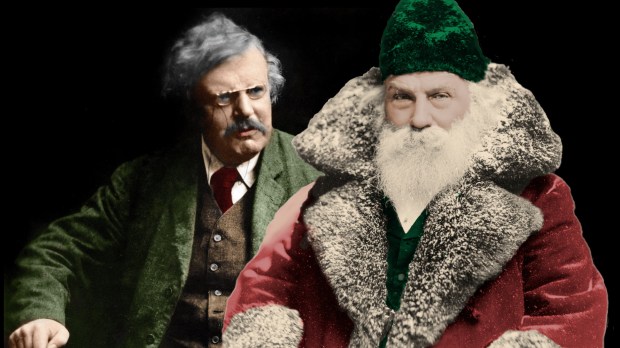In the mid-seventeenth century when Christmas was banned in England by the Puritans, Father Christmas became a spirit of resistance, the spirit of the Merry England of the past which had celebrated its Catholic faith with festive exuberance. He emerges again in Victorian times, making a guest appearance as the Ghost of Christmas Present in Charles Dickens’ A Christmas Carol.
Father Christmas also makes a guest appearance in “The Shop of Ghosts”, a lesser-known story by G. K. Chesterton. In this story, Chesterton imagines himself staring in the window of a toy shop on a cold winter’s night. Then, when he enters the shop, it’s as though he had crossed the threshold into a fairy story, as though the door to the shop had been the door of a wardrobe.
Into the strange toy shop
“I had strayed into some odd atmosphere…. It was as if I had … stepped across some border in the soul.”
Wishing to purchase some wooden soldiers, Chesterton approaches the old man at the counter, who was “very old and broken, with confused white hair covering his head and half his face, hair so startlingly white that it looked almost artificial”. Chesterton then puts money on the counter to pay for the toys but the man pushes it away.
“No, no,” he said vaguely. “I never have. I never have. We are rather old-fashioned here.”
“Not taking money,” I replied, “seems to me more like an uncommonly new fashion than an old one.”
“I never have,” said the old man…. “I’ve always given presents. I’m too old to stop.”
“Good heavens!” I said. “What can you mean? Why, you might be Father Christmas.”
“I am Father Christmas,” he said apologetically….
The old man looked feeble and sick.
“I am dying,” he said…. “All the new people have left my shop. I cannot understand it. They seem to object to me on such curious and inconsistent sort of grounds, these scientific men, and these innovators. They say that I give people superstitions and make them too visionary…. I don’t understand. But I understand one thing well enough. These modern people are living and I am dead.”
“You may be dead,” I replied. “You ought to know. But as for what they are doing – do not call it living.”

Not dead quite yet
At this point a man enters the shop, dressed in old-fashioned Victorian clothes. He takes one look at the old man and is “utterly staggered” by what he sees.
“Good lord!” he cried out; “it can’t be you! It isn’t you! I came to ask where your grave was.”
“I’m not dead yet, Mr. Dickens,” said the old gentleman, with a feeble smile: “but I’m dying,” he hastened to add reassuringly.
“But, dash it all, you were dying in my time,” the Ghost of Charles Dickens exclaimed, “and you don’t look a day older.”
“I’ve felt like this for a long time,” said Father Christmas.
Dickens’ Ghost rushes to the toy shop door, opens it and calls to someone outside in the dark.
“Dick,” he roared at the top of his voice: “he’s still alive.”
Ghosts and more ghosts
The Ghost of Sir Richard Steele, the early eighteenth-century writer, enters the shop and is as astonished as Dickens by the sight of Father Christmas, very much alive, if not particularly well. “Indeed,” he proclaimed, “’tis a most prodigiouis matter, for the man was dying when I wrote about Sir Roger de Coverley and his Christmas Day.”
Then the Ghost of Ben Jonson, Shakespeare’s friend, enters and surveys Father Christmas with interest. “It hath ever been understood … that such good and hearty customs were fallen sick and like to pass from the world. This grey beard most surely was no lustier when I knew him than now.”
A fourth ghost enters, “a green-clad man, like Robin Hood” who stared at Father Christmas in disbelief. “But I saw the man dying,” he exclaimed.
“I understand it now,” cried the Ghost of Dickens, as if receiving a divine revelation, “you will never die.”
In this climactic twist to the end of his ghost story, Chesterton turns Father Christmas not merely into a symbolic representation of the spirit of Christmas but into a symbol of Christianity itself. “Christianity has died many times and risen again,” Chesterton wrote in The Everlasting Man, “for it had a God who knew the way out of the grave.”



